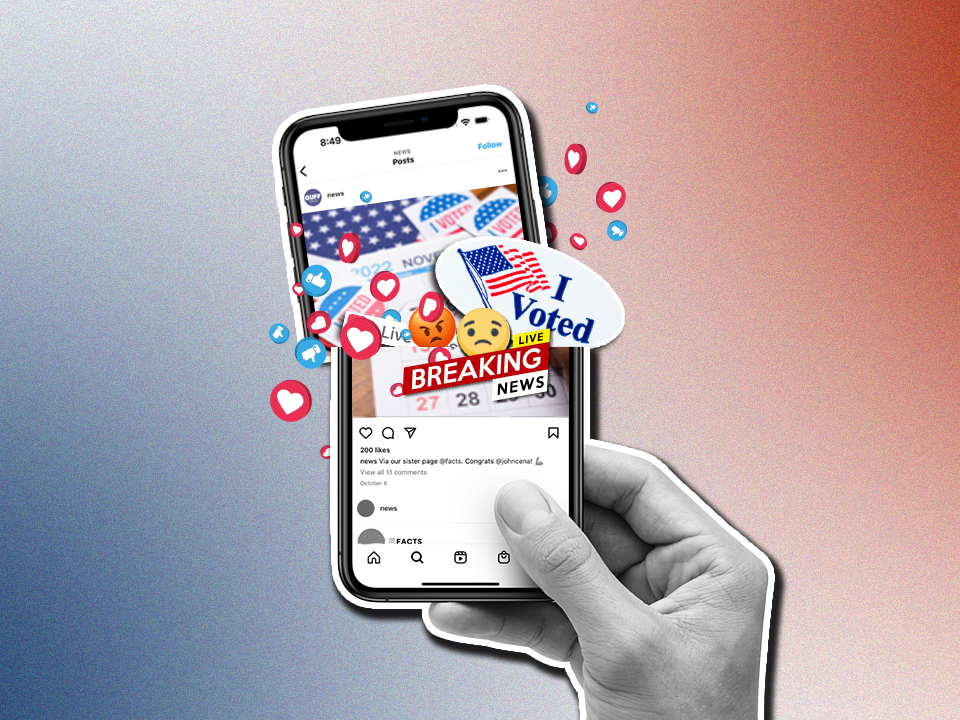How to Mentally Survive Election Season
Tips for this one…and all the ones to come.
Fall is the time when we collectively don plaid, watch Hocus Pocus on repeat without shame, and decorate our homes with equal parts creepy things and decorative gourds. But every other year in the U.S., fall also ushers in something even scarier: election season anxiety.
Whether it’s a midterm or a presidential election year, the month leading up to Election Day feels frightful even for the most apolitical among us. Fifty-two percent of U.S. adults say the upcoming midterms are a significant source of stress, and 66 percent say the current political climate is a big stressor, according to a recent survey conducted by the American Psychological Association (APA).
It’s completely understandable to feel more than a little freaked out about the pending midterm elections. After all, the fate of reproductive rights, LGBTQ+ rights, progress on climate change, and more are directly affected by whatever political party controls the House and Senate (which write and pass legislation). Since both chambers of Congress are up for grabs on Election Day, yeah, it’s a lot.
So how do we get through this without totally losing it? We talked to mental health experts to help make election season, and all it entails, a little less frightful.
Why elections make you feel literally terrible
An obvious statement: The results of political elections have real-world consequences on people’s lives—their rights, their finances, and more—the stakes of which are extremely stressful. “A quality of anxiety disorders or symptoms is this feeling of being out of control,” says clinical psychologist Anjali Ferguson, PhD. “A lot of what crops up around election season is not knowing what these outcomes mean or not knowing if you can control what’s coming down the pike.” Anticipating those big unknowns drives a lot of (very, very understandable) fear and stress, she says.
To be clear, election stress disorder is not an “official” mental health condition, and you won’t find it in the DSM-5-TR, the manual mental health pros use to diagnose patients. But some research suggests that politics is essentially a chronic source of stress, so it’s not surprising to mental health experts that elections can be uniquely anxiety-inducing. “[Election stress disorder] was coined [by Steven Stosny, PhD, in 2016] to kind of differentiate the anxiety that's specifically around elections because it could manifest from somebody that doesn't otherwise have other pre-existing anxiety disorders or tendencies,” says Dr. Ferguson.
That said there’s very limited research on election stress because it is a relatively new phenomenon. But, anecdotally, experts say that the effects of this stress can be powerful. “Sometimes it might manifest as having some trouble with things like sleeping or eating, or just being really preoccupied with our thoughts around the election and election cycle and outcomes,” Dr. Ferguson says. People can also become irritable, angry, or short-tempered as a result of this stress, she says. If unaddressed, election stress can impact a person’s functioning at work, school, or in relationships, she adds.
Election season can also cause significant social tension, which further contributes to stress, adds psychiatrist Margaret Seide, MD. She finds that her clients often dread family gatherings during and after a major election because they worry about having to talk politics with loved ones who might not agree with their views. “If you have a relative who will be at the same table and feels the exact opposite [as you], there's a lot of tension,” she says. That might take some of the joy out of socialization or make someone avoid gathering with folks at all, she says.
“Election time often highlights divided families and communities and creates a lot of frustration,” agrees psychotherapist Thomas A. Vance, PhD. It doesn’t help that we have a 24/7 news cycle and constant access to social media, which is often where people discuss or learn about politics, says Dr. Ferguson. “It’s really easy for us to get caught in this negative cycle that magnifies our stress and anxiety,” she says of the news today. The more you consume, the more stressed and angry you likely feel, she adds.
Dr. Seide also finds that voting itself can contribute to a person’s election stress since some people have to take time off work and/or find childcare to ensure they can vote. The “Cost of Voting in the United States: 2022” report, published in the Election Law Journal, also found that many states have laws making it harder for people to vote, like requiring photo IDs or restricting eligibility for mail-in ballots. And if someone decides not to vote (or is unable to) due to these barriers, they might feel a lot of shame or guilt, adds Dr. Seide.
How to cope with election anxiety
Unfortunately, peacing out of the democratic process isn’t a great option either. So here are some simple ways to manage the stress of the szn.
Limit your overall news and social media consumption.
All three experts interviewed for this story agree that this is key. Dr. Ferguson recommends setting a firm time limit on daily consumption, scheduling it in your calendar, and closing apps or changing the channel when that time is up. “That way, you're not getting sucked into that cycle,” she says.
Set boundaries with your loved ones about political talk.
Stuck in a split household or dreading your debate-happy coworkers? Decide what you’ll discuss (or how it’s discussed) ahead of time and let them know. “If there's really something that [you] do not want to talk about, then [you] should make that clear, and maybe even vote with [your] feet by walking away,” she says. Or, if you’re game, tell people that you’re happy to talk politics, but will not engage if things get heated or personal, she says.
Enlist help from a trusted friend.
Having a friend to keep you accountable to your boundaries can help you be more consistent, says Dr. Ferguson. This person can, for example, gently call you out if they notice you’re spending way too much time on news sites or tap you out of a heated convo about politics. “If somebody can do that for you, it helps us just shift and refocus again,” she says, especially if you’re struggling to do it for yourself.
Find a way to get involved.
If you’re worried about the election and what it will mean for you and your community, Dr. Ferguson recommends channeling that into action. Think: volunteering for a campaign, signing up to work the polls on election day, getting involved with a group in your community taking action on an issue you care about, etc. Not only is it a more productive outlet for stress than doom scrolling, but Dr. Ferguson says action can help you regain a sense of control, which can help mitigate some of those anxious feelings.
Make a plan for election day
A study published in the International Journal of Psychiatry earlier this year found that when people anticipate feeling election stress on a certain day, they will feel it—even if they’re not exposed to any actual election-related stressors (like news or polling results) on that day. That’s why Dr. Vance recommends making a game plan to “protect your peace,” on the day of to better protect you from stress. This could mean taking time to do something relaxing or fun off of social media, or avoiding conversations around elections by practicing boundaries, he says. Choose your own sanity-saving adventure.
Wondermind does not provide medical advice, diagnosis, or treatment. Any information published on this website or by this brand is not intended as a replacement for medical advice. Always consult a qualified health or mental health professional with any questions or concerns about your mental health.




